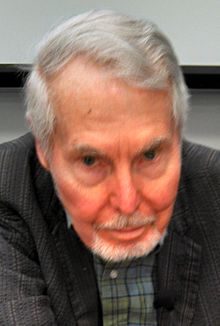John David Jackson (physicist)
John David Jackson (born January 19, 1925 in London , Canada; † May 20, 2016 in Lansing , Michigan ) was a Canadian -American theoretical physicist . He was a professor at the University of California, Berkeley and a contributor to the Lawrence Berkeley National Laboratory . He is best known for his textbook on electrodynamics .
Life
Jackson studied physics and mathematics at the University of Western Ontario in London, which he graduated with a bachelor's degree in 1946 . He received his doctorate in 1949 from the Massachusetts Institute of Technology , Cambridge , where he made his first publication at the Radiation Laboratory, with John Blatt and Victor Weisskopf in nuclear physics . He held a research position there until the end of the year, when he received his first teaching position as Assistant Professor of Mathematics at the Canadian McGill University in Montreal . Later promoted to associate professor , he stayed there until June 30, 1957. 1956/1957 he stayed for research purposes in Princeton with Eugene Wigner and John Archibald Wheeler . During this time Jackson began to turn to elementary particle physics. In 1957, at the invitation of Frederick Seitz, he moved to a physics chair at the University of Illinois at Urbana-Champaign , from 1958 on as a full professor. On July 1, 1967, he moved on to the University of California, Berkeley . From 1978 to 1981 he headed the physics department there. On January 1, 1993, Jackson was retired.
In addition to these main university positions, Jackson also worked for the first time in 1966 as a visiting scientist at the Lawrence Berkeley National Laboratory , to which he was a permanent employee from 1967. 1970/1971, 1974 to 1976 and 1977/1978 he was group leader of the theoretical physics there, 1982 to 1984 director of the entire physics department. Even after his retirement he was still active here.
Further positions or participations were 1956/1957 as a John Simon Guggenheim Fellow at Princeton University , 1958/1959 as a consultant to Space Technology Laboratories , 1963/1964, 1970, 1976/77, 1979, 1981, 1984, 1988 in various collaborations at CERN , 1970 as visiting scholar at Cambridge University , 1972/1973 as chairman of the theory department at Fermilab , 1977 to 1993 as editor for the journal Annual Review of Nuclear and Particle Science , 1984 to 1987 as vice director of the (appointed in 1993 for financial reasons) Superconducting Super Collider Project and 1988/1989 as a visiting scientist at the University of Oxford .
Jackson became a US citizen on April 12, 1988. His students include Kurt Gottfried (whom he taught at McGill University), Chris Quigg, and Gordon Kane .
plant
Jackson initially dealt with nuclear physics . In his dissertation he dealt with the application of the theory of effective range (by Julian Schwinger and Hans Bethe ) to nucleon-nucleon scattering at low energy, presented in Reviews of Modern Physics Vol. 22, 1950 (with John Blatt). In the mid-1950s he showed that the muon catalysis of deuterium - tritium - fusion reactions , which was just observed by Luis Walter Alvarez at the time and which was highly hoped for, could not be used for energy use (because of the upper limit of the per muon that he determined producible fusions, Physical Review Vol. 106, 1957, p. 330). From 1957 he turned to particle physics and investigated u. a. Dispersion relations , possible time-reversal symmetry violations (1957 with Sam Treiman ) and, in the 1960s, angular distributions for resonance decays in scattering reactions (then of kaons and protons), with the introduction of the Gottfried Jackson angles (also called Jackson angles ).
Jackson authored several textbooks. His Classical Electrodynamics , first published by Wiley in 1962 and based on lectures at McGill University, is the most important standard work on electrodynamics worldwide, along with the textbook by Wolfgang Panofsky and Melba Phillips (new editions appeared in 1975, the third edition in 1998). Further works are Physics of Elementary Particles (Princeton, 1958, 135 pages) and Mathematics for Quantum Mechanics (1962).
Honors
Jackson was a Fellow of the American Physical Society and American Association for the Advancement of Science , a member of the National Academy of Sciences and the American Academy of Arts and Sciences . He received an honorary doctorate from the University of Western Ontario in 1989 and the Berkeley Distinguished Teaching Award (1986) and Berkeley Citation (1993).
Web links
- Literature by and about John David Jackson in the catalog of the German National Library
- Homepage at the Berkeley Lab with an autobiographical article from Ann.Rev.Nucl.Part.Sciences 1999
| personal data | |
|---|---|
| SURNAME | Jackson, John David |
| BRIEF DESCRIPTION | Canadian-American physicist |
| DATE OF BIRTH | January 19, 1925 |
| PLACE OF BIRTH | London , Ontario , Canada |
| DATE OF DEATH | May 20, 2016 |
| Place of death | Lansing , Michigan |
